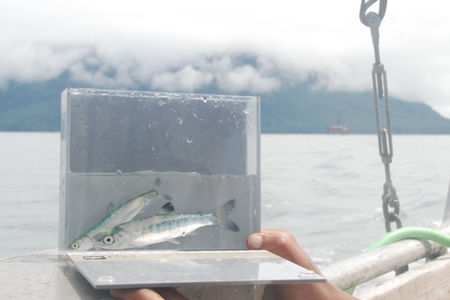Our Research
-
Basic and applied science—Knowledge generation and application to conservation and management.
-
Aquatic ecology—We primarily work in freshwater and estuary ecosystems, and study salmon across their life cycle as well as their communities and ecosystems.
-
Scales of study—Individual life stages, focal populations, watersheds, and regional/continental.
-
Methods—Field sampling takes place primarily at sites throughout BC, and is often combined with big data analysis and modelling.
-
Analyses—GIS, Bayesian, time series analyses, stable isotopes.
-
Collaborative—We work with diverse partners including: First Nations, DFO, the Province, eNGOs and other organizations.
Our research is tied together by a suite of linked themes:
Informing Habitat Management & Conservation




We aim to do work that informs the management and conservation of coastal ecosystems, to ultimately improve the sustainability of natural resources. By better understanding the consequences of different land use activities, we aim to better inform the ecological trade-offs of different management scenarios and clarify environmental decision-making. For example, our collaborative research illuminated the environmental risks of proposed industrial development in the Skeena River estuary. This research consists of both field work, syntheses of states of knowledge, as well as work at the science-policy interface to identify and address potential gaps or disconnects between science and environmental laws.
Understanding Climate Change & Watershed Dynamics




At the intersection of ecology and physical sciences, we study how climate change and other stressors are rapidly changing watershed systems. Much of this work takes a forward-looking perspective to understand how climate change and other drivers change aquatic ecosystems and create challenges and opportunities for salmon. A key question is understanding the processes that enable system resilience and clarifying the limits of that resilience. Active areas of research in this theme include: sea-level rise and estuary squeeze (in partnership with Nature Trust Canada and many others), glacier retreat and salmon futures (a Salmon-Net project), temperature and water flows in river networks, the emergent resilience of rivers as natural portfolios, and phenological change in salmon life-histories.
Salmon Biodiversity & Dynamics




A core theme of our work is understanding the dynamics and diversity of Pacific salmon. Through field work, big data approaches, and theory, we examine the causes and consequences of salmon life-history diversity and population dynamics. We are also interested in linking understanding of salmon populations to their effective stewardship and management.
.png)





